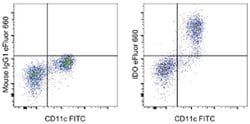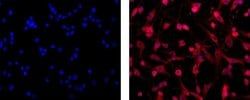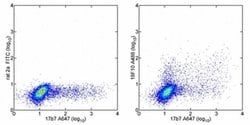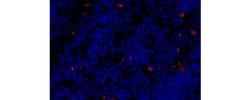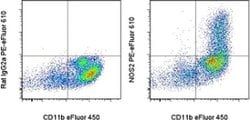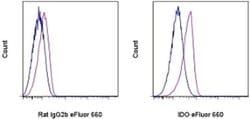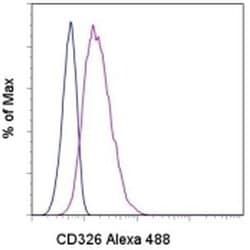7092308
IDO Monoclonal Antibody (mIDO-48), eFluor™ 660, eBioscience™, Invitrogen™
Rat Monoclonal Antibody
Manufacturer: Fischer Scientific
The price for this product is unavailable. Please request a quote
Antigen
IDO
Concentration
0.2 mg/mL
Classification
Monoclonal
Form
Liquid
Regulatory Status
RUO
Formulation
PBS with 0.09% sodium azide; pH 7.2
Gene Alias
EC 1.13.11.52; IDO; IDO1; IDO-1; INDO; indolamine 2,3 dioxygenase; indole 2,3-dioxygenase; indoleamine; indoleamine 2,3-dioxygenase 1; indoleamine 23-dioxygenase; Indoleamine-2; indoleamine-pyrrole 2,3 dioxygenase; indoleamine-pyrrole 2,3-dioxygenase
Gene Symbols
Ido1
Primary or Secondary
Primary
Content And Storage
4° C, store in dark, DO NOT FREEZE!
Gene
Ido1
Clone
mIDO-48
Applications
Flow Cytometry, Immunocytochemistry, Immunohistochemistry (Paraffin), Western Blot
Conjugate
eFluor 660
Host Species
Rat
Target Species
Mouse
Gene Accession No.
P28776
Gene ID (Entrez)
15930
Isotype
IgG2b κ
Purification Method
Affinity chromatography
Product Type
Antibody
Description
- Description: The monoclonal antibody mIDO-48 reacts with mouse indoleamine 2,3-dioxygenase 1(IDO1)
- IDO1 is an enzyme expressed intracellularly by dendritic cells, interferon gamma activated macrophages, epithelial cells, vascular endothelium and tumor cells
- This enzyme catalyzes tryptophan into kynurenine metabolites
- The reduction of tryptophan and the introduction of kynurenine metabolites in the microenvironment of IDO-expressing cells suppress T cell proliferation and promote the activation and induction of regulatory T cells
- Applications Reported: This mIDO-48 antibody has been reported for use in intracellular staining followed by flow cytometric analysis
- Applications Tested: This mIDO-48 antibody has been tested by intracellular staining and flow cytometric analysis of mouse splenocytes using the Intracellular Fixation & Permeabilization Buffer Set (cat
- 88-8824) and protocol
- Please refer to Best Protocols: Protocol A: Two step protocol for (cytoplasmic) intracellular proteins located under the Resources Tab online
- This can be used at less than or equal to 1 μg per test
- A test is defined as the amount (μg) of antibody that will stain a cell sample in a final volume of 100 μL
- Cell number should be determined empirically but can range from 10^5 to 10^8 cells/test
- It is recommended that the antibody be carefully titrated for optimal performance in the assay of interest
- IDO1 is an intracellular heme-containing enzyme that catalyzes the oxidative cleavage of the indole ring of several important regulatory molecules like tryptophan, serotonin, and melatonin
- By doing this, IDO1 initiates the production of biologically active metabolites, commonly referred to as kynurenines
- IDO1 is widely expressed in a variety of human tissues as well as in macrophages and dendritic cells (DCs)
- In inflammation, interferons (IFNs) act on specific receptors to trigger IDO1 induction
- The production of IFN-gamma and induction of IDO1 represent important antimicrobial mechanisms
- Degradation and depletion of tryptophan by IDO1 inhibits the growth of viruses, bacteria and parasites
- Furthermore, IDO1 plays a complex and crucial role in immunoregulation during infection, pregnancy, autoimmunity, transplantation, and neoplasia.
Compare Similar Items
Show Difference
Antigen: IDO
Concentration: 0.2 mg/mL
Classification: Monoclonal
Form: Liquid
Regulatory Status: RUO
Formulation: PBS with 0.09% sodium azide; pH 7.2
Gene Alias: EC 1.13.11.52; IDO; IDO1; IDO-1; INDO; indolamine 2,3 dioxygenase; indole 2,3-dioxygenase; indoleamine; indoleamine 2,3-dioxygenase 1; indoleamine 23-dioxygenase; Indoleamine-2; indoleamine-pyrrole 2,3 dioxygenase; indoleamine-pyrrole 2,3-dioxygenase
Gene Symbols: Ido1
Primary or Secondary: Primary
Content And Storage: 4° C, store in dark, DO NOT FREEZE!
Gene: Ido1
Clone: mIDO-48
Applications: Flow Cytometry, Immunocytochemistry, Immunohistochemistry (Paraffin), Western Blot
Conjugate: eFluor 660
Host Species: Rat
Target Species: Mouse
Gene Accession No.: P28776
Gene ID (Entrez): 15930
Isotype: IgG2b κ
Purification Method: Affinity chromatography
Product Type: Antibody
Antigen:
IDO
Concentration:
0.2 mg/mL
Classification:
Monoclonal
Form:
Liquid
Regulatory Status:
RUO
Formulation:
PBS with 0.09% sodium azide; pH 7.2
Gene Alias:
EC 1.13.11.52; IDO; IDO1; IDO-1; INDO; indolamine 2,3 dioxygenase; indole 2,3-dioxygenase; indoleamine; indoleamine 2,3-dioxygenase 1; indoleamine 23-dioxygenase; Indoleamine-2; indoleamine-pyrrole 2,3 dioxygenase; indoleamine-pyrrole 2,3-dioxygenase
Gene Symbols:
Ido1
Primary or Secondary:
Primary
Content And Storage:
4° C, store in dark, DO NOT FREEZE!
Gene:
Ido1
Clone:
mIDO-48
Applications:
Flow Cytometry, Immunocytochemistry, Immunohistochemistry (Paraffin), Western Blot
Conjugate:
eFluor 660
Host Species:
Rat
Target Species:
Mouse
Gene Accession No.:
P28776
Gene ID (Entrez):
15930
Isotype:
IgG2b κ
Purification Method:
Affinity chromatography
Product Type:
Antibody
Antigen: IDO
Concentration: 5 μL/Test
Classification: Monoclonal
Form: Liquid
Regulatory Status: RUO
Formulation: PBS with 0.2% BSA and 0.09% sodium azide; pH 7.2
Gene Alias: EC 1.13.11.52; IDO; IDO1; IDO-1; INDO; indolamine 2,3 dioxygenase; indole 2,3-dioxygenase; indoleamine; indoleamine 2,3-dioxygenase 1; indoleamine 23-dioxygenase; Indoleamine-2; indoleamine-pyrrole 2,3 dioxygenase; indoleamine-pyrrole 2,3-dioxygenase
Gene Symbols: Ido1
Primary or Secondary: Primary
Content And Storage: 4° C, store in dark, DO NOT FREEZE!
Gene: Ido1
Clone: eyedio
Applications: Flow Cytometry
Conjugate: eFluor 660
Host Species: Mouse
Target Species: Human
Gene Accession No.: P14902
Gene ID (Entrez): 3620
Isotype: IgG1 κ
Purification Method: Affinity chromatography
Product Type: Antibody
Antigen:
IDO
Concentration:
5 μL/Test
Classification:
Monoclonal
Form:
Liquid
Regulatory Status:
RUO
Formulation:
PBS with 0.2% BSA and 0.09% sodium azide; pH 7.2
Gene Alias:
EC 1.13.11.52; IDO; IDO1; IDO-1; INDO; indolamine 2,3 dioxygenase; indole 2,3-dioxygenase; indoleamine; indoleamine 2,3-dioxygenase 1; indoleamine 23-dioxygenase; Indoleamine-2; indoleamine-pyrrole 2,3 dioxygenase; indoleamine-pyrrole 2,3-dioxygenase
Gene Symbols:
Ido1
Primary or Secondary:
Primary
Content And Storage:
4° C, store in dark, DO NOT FREEZE!
Gene:
Ido1
Clone:
eyedio
Applications:
Flow Cytometry
Conjugate:
eFluor 660
Host Species:
Mouse
Target Species:
Human
Gene Accession No.:
P14902
Gene ID (Entrez):
3620
Isotype:
IgG1 κ
Purification Method:
Affinity chromatography
Product Type:
Antibody
Antigen: Myosin 4
Concentration: 0.5 mg/mL
Classification: Monoclonal
Form: Liquid
Regulatory Status: RUO
Formulation: PBS with 0.09% sodium azide; pH 7.2
Gene Alias: 2B myosin heavy chain; AI506973; fast myosin heavy chain 2B; LOW QUALITY PROTEIN: myosin-4; MHC; MHC2B; Minimsc; Minmus; MM; MYH1; MYH2B; MYH-2B; myh4; MyHC IIb isoform; myHC-2b; MyHC-IIb; Myhsf; myosin heavy chain; myosin heavy chain 1; myosin heavy chain 2b; myosin heavy chain 2X; myosin heavy chain 4; Myosin heavy chain IIb; myosin heavy chain IIb isoform; myosin heavy chain isoform 2b; myosin heavy chain type IIb; Myosin heavy chain, skeletal muscle; myosin heavy chain, skeletal muscle, fetal; Myosin heavy chain, skeletal muscle, juvenile; myosin, heavy chain 4, skeletal muscle; myosin, heavy polypeptide 4, skeletal muscle; myosin-4; unnamed protein product
Gene Symbols: MYH4
Primary or Secondary: Primary
Content And Storage: 4° C, store in dark, DO NOT FREEZE!
Gene: MYH4
Clone: MF20
Applications: Immunocytochemistry, Immunohistochemistry (Frozen), Western Blot
Conjugate: Alexa Fluor 488
Host Species: Mouse
Target Species: Bovine, Canine, Chicken, Chimpanzee, Feline, Guinea Pig, Human, Mouse, Non-human Primate, Rabbit, Rat
Gene Accession No.: Q076A5, Q28641, Q29RW1, Q5SX39, Q9Y623
Gene ID (Entrez): 100009548, 100125991, 100726456, 17884, 360543, 408020, 4622, 468396, 479502
Isotype: IgG2b κ
Purification Method: Affinity chromatography
Product Type: Antibody
Antigen:
Myosin 4
Concentration:
0.5 mg/mL
Classification:
Monoclonal
Form:
Liquid
Regulatory Status:
RUO
Formulation:
PBS with 0.09% sodium azide; pH 7.2
Gene Alias:
2B myosin heavy chain; AI506973; fast myosin heavy chain 2B; LOW QUALITY PROTEIN: myosin-4; MHC; MHC2B; Minimsc; Minmus; MM; MYH1; MYH2B; MYH-2B; myh4; MyHC IIb isoform; myHC-2b; MyHC-IIb; Myhsf; myosin heavy chain; myosin heavy chain 1; myosin heavy chain 2b; myosin heavy chain 2X; myosin heavy chain 4; Myosin heavy chain IIb; myosin heavy chain IIb isoform; myosin heavy chain isoform 2b; myosin heavy chain type IIb; Myosin heavy chain, skeletal muscle; myosin heavy chain, skeletal muscle, fetal; Myosin heavy chain, skeletal muscle, juvenile; myosin, heavy chain 4, skeletal muscle; myosin, heavy polypeptide 4, skeletal muscle; myosin-4; unnamed protein product
Gene Symbols:
MYH4
Primary or Secondary:
Primary
Content And Storage:
4° C, store in dark, DO NOT FREEZE!
Gene:
MYH4
Clone:
MF20
Applications:
Immunocytochemistry, Immunohistochemistry (Frozen), Western Blot
Conjugate:
Alexa Fluor 488
Host Species:
Mouse
Target Species:
Bovine, Canine, Chicken, Chimpanzee, Feline, Guinea Pig, Human, Mouse, Non-human Primate, Rabbit, Rat
Gene Accession No.:
Q076A5, Q28641, Q29RW1, Q5SX39, Q9Y623
Gene ID (Entrez):
100009548, 100125991, 100726456, 17884, 360543, 408020, 4622, 468396, 479502
Isotype:
IgG2b κ
Purification Method:
Affinity chromatography
Product Type:
Antibody
Antigen: CD326 (EpCAM)
Concentration: 5 μL/Test
Classification: Monoclonal
Form: Liquid
Regulatory Status: RUO
Formulation: PBS with 0.2% BSA and 0.09% sodium azide; pH 7.2
Gene Alias: adenocarcinoma-associated antigen; CD326; cell surface glycoprotein Trop-1; DIAR5; EGP; EGP-2; EGP314; EGP40; EPCAM; Ep-CAM; EpCAM1; epithelial cell adhesion molecule; Epithelial cell surface antigen; Epithelial glycoprotein; Epithelial glycoprotein 314; ESA; GA733-2; gp40; hEGP314; HNPCC8; human epithelial glycoprotein-2; KS 1/4 antigen; KS1/4; KSA; Ly74; lymphocyte antigen 74; M1S2; M4S1; major gastrointestinal tumor-associated protein GA733-2; mEGP314; membrane component, chromosome 4, surface marker (35kD glycoprotein); MIC18; MK-1; panepithelial glycoprotein 314; protein 289A; Protein D5.7A; Tacsd1; Tacstd1; TROP1; Trop-1 protein; Tumor-associated calcium signal transducer 1
Gene Symbols: EPCAM
Primary or Secondary: Primary
Content And Storage: 4° C, store in dark, DO NOT FREEZE!
Gene: EPCAM
Clone: MH99
Applications: Flow Cytometry
Conjugate: Alexa Fluor 488
Host Species: Mouse
Target Species: Human
Gene Accession No.: P16422
Gene ID (Entrez): 4072
Isotype: IgG2a κ
Purification Method: Affinity chromatography
Product Type: Antibody
Antigen:
CD326 (EpCAM)
Concentration:
5 μL/Test
Classification:
Monoclonal
Form:
Liquid
Regulatory Status:
RUO
Formulation:
PBS with 0.2% BSA and 0.09% sodium azide; pH 7.2
Gene Alias:
adenocarcinoma-associated antigen; CD326; cell surface glycoprotein Trop-1; DIAR5; EGP; EGP-2; EGP314; EGP40; EPCAM; Ep-CAM; EpCAM1; epithelial cell adhesion molecule; Epithelial cell surface antigen; Epithelial glycoprotein; Epithelial glycoprotein 314; ESA; GA733-2; gp40; hEGP314; HNPCC8; human epithelial glycoprotein-2; KS 1/4 antigen; KS1/4; KSA; Ly74; lymphocyte antigen 74; M1S2; M4S1; major gastrointestinal tumor-associated protein GA733-2; mEGP314; membrane component, chromosome 4, surface marker (35kD glycoprotein); MIC18; MK-1; panepithelial glycoprotein 314; protein 289A; Protein D5.7A; Tacsd1; Tacstd1; TROP1; Trop-1 protein; Tumor-associated calcium signal transducer 1
Gene Symbols:
EPCAM
Primary or Secondary:
Primary
Content And Storage:
4° C, store in dark, DO NOT FREEZE!
Gene:
EPCAM
Clone:
MH99
Applications:
Flow Cytometry
Conjugate:
Alexa Fluor 488
Host Species:
Mouse
Target Species:
Human
Gene Accession No.:
P16422
Gene ID (Entrez):
4072
Isotype:
IgG2a κ
Purification Method:
Affinity chromatography
Product Type:
Antibody
